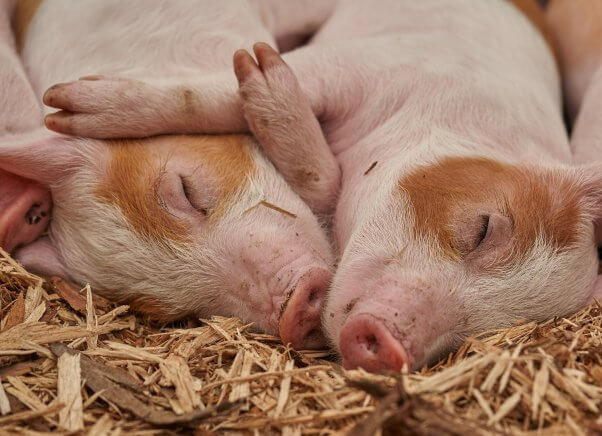Ivy League Scientist Pummeled Pigs’ Brains and Likely Falsified Data
The University of Pennsylvania (Penn) has a long and disturbing history of smashing animals’ brains in pseudo-science experiments.
It just got longer and more sordid.
William Armstead has left the school amid an investigation into his experiments that involved smashing piglets’ brains. First, he’d drill a hole in the skulls of these babies. Then, he’d use a cylinder to hammer down on their exposed brains. After mutilating and killing the sensitive piglets, he appears to have faked his results, publishing data he later requested be retracted from scientific journals.
Armstead’s Lies Caused Sensitive Pigs to Endure a Life Full of Suffering
Since Armstead requested that his own findings be retracted on five separate occasions, it’s likely that these discrepancies were the result of deliberate misconduct, according to Retraction Watch. The National Institutes of Health had funded Armstead’s experiments on piglets with nearly $2 million in grants—tax money that should be returned now that the experiments’ results have been called into question.
The pigs whose brains were callously smashed don’t get their lives back just because Armstead retracted his findings. Pigs, whom scientists rank among the most intelligent animals, sing to their young while nursing and form close relationships with one another. They deserve to live without being mutilated in laboratories and on farms.

Penn Has a Long History of Inflicting Horror on Animals
This isn’t the first time that Penn experimenters have smashed animals’ brains. In fact, the school has an entire laboratory devoted to this type of experiment.
In 1984, PETA released Unnecessary Fuss, a film that uses footage taken by Penn experimenters from that laboratory, in which they subjected baboons to horrific head injuries and then mocked them.
In the film, experimenters admit that a monkey is inadequately anesthetized but hold him down and continue cutting into his head anyway as he jerks away in pain. They restrain baboons on a table, cement their heads into metal helmets, and use a hydraulic device to thrust them forward with an acceleration of up to 1,000 units of g-force in order to inflict severe head injuries. (Just 15 units can kill a human being.) The animals struggle against their restraints, showing that they’re conscious during the procedure.
PETA shared the film with members of Congress and the public, resulting in significant amendments to laws governing the treatment of animals in laboratories. The exposé led the U.S. government to cut off all funding for the experiment.
Cats, Rats, and Sexual Assault
Tracy McIntosh later became director of this infamous laboratory, an appropriate appointment for this torture chamber. He subjected rats and cats to brain-deforming injuries, but his atrocities didn’t stop there. In 2003, he was arrested for the rape of a Penn veterinary student who had accused him of giving her Nembutal, a “date rape” drug that was used in his laboratory to kill rats. He pleaded no contest to one count of sexual assault and was sentenced to up to seven years in prison. The sentencing judge said that his crime was “breathtaking in its vileness.”
Good Science Isn’t Cruel: PETA’s Research Modernization Deal
Experiments on animals are a colossal failure. Ninety-five percent of all new drugs that test safe and effective in animal tests fail or cause harm in human clinical trials.
PETA scientists have developed a strategy for replacing the use of animals in experiments with human-relevant, superior methods. We’re calling on congressional leaders to embrace the revolutionary, commonsense Research Modernization Deal and direct our federal health agencies to stop harming animals and wasting money on experiments that aren’t working. If you live in the U.S., contact your members of Congress and ask them to help bring U.S. science into the 21st century.

